Pyrenean Mastiff
Natalia Miachikova/iStock / Getty Images Plus via Getty Images
The Pyrenean Mastiff is a rare giant dog originally bred as a livestock guardian in the Spanish Pyrenees Mountains. They’re laid-back, social, and loyal, but always up for a job—all traits that trace back to their time working in the mountains.
“They would travel during the migration patterns of the sheep with the shepherd,” says Karina Whittington, president of the Pyrenean Mastiff Association of America (PMAA). “So they were never by themselves. They always had their shepherd with them.”
Pyrenean Mastiff dogs wear a medium-length double coat that comes in white with patches of color. Full grown, these dogs weigh 120–190 pounds and can be 25–31 inches tall. When cared for properly, a Pyrenean Mastiff can expect to live 8–12 years, which is about the average lifespan for giant dogs.
Though Pyrenean Mastiffs are a rare dog breed, they’re closely related to the more popular Great Pyrenees.
Caring for a Pyrenean Mastiff
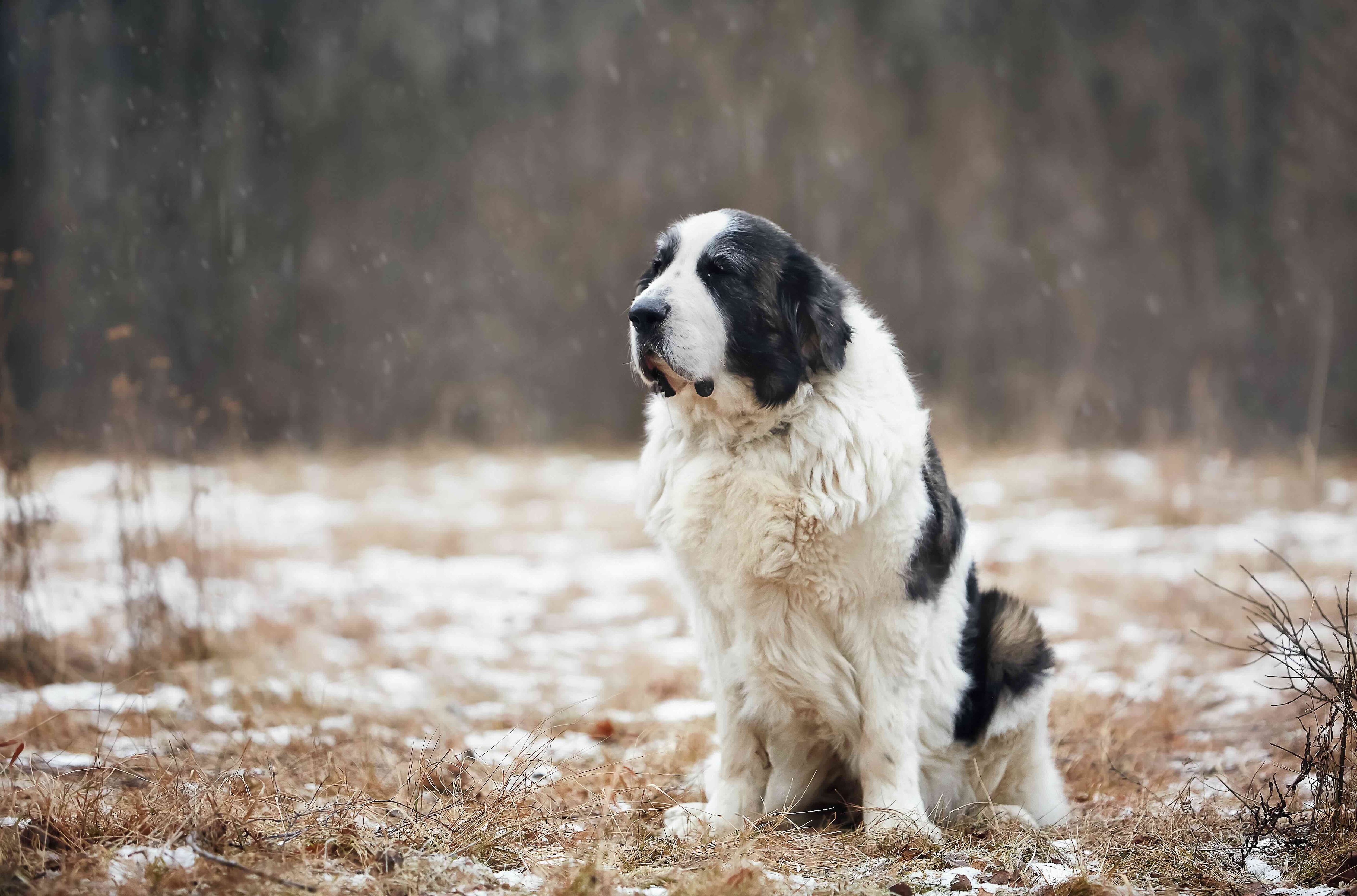
Affectionate, alert, and versatile, the Pyrenean Mastiff dog can be a great, easygoing option for families. Although they enjoy roaming large properties, they’re happiest spending time with their favorite humans.
“They love their people,” says Crystal Kaiser, a board member of the PMAA. “They really do better when they have interaction with people. And they like a job, being able to have something that they're taking care of.”
Despite their thick, double coat, a Pyrenean Mastiff’s grooming needs are straightforward, requiring just biweekly maintenance. And while they’re happy to join their pet parents on hikes or neighborhood walks, these calm dogs require relatively little exercise, especially compared to more high-energy breeds.
Pyrenean Mastiff Health Issues
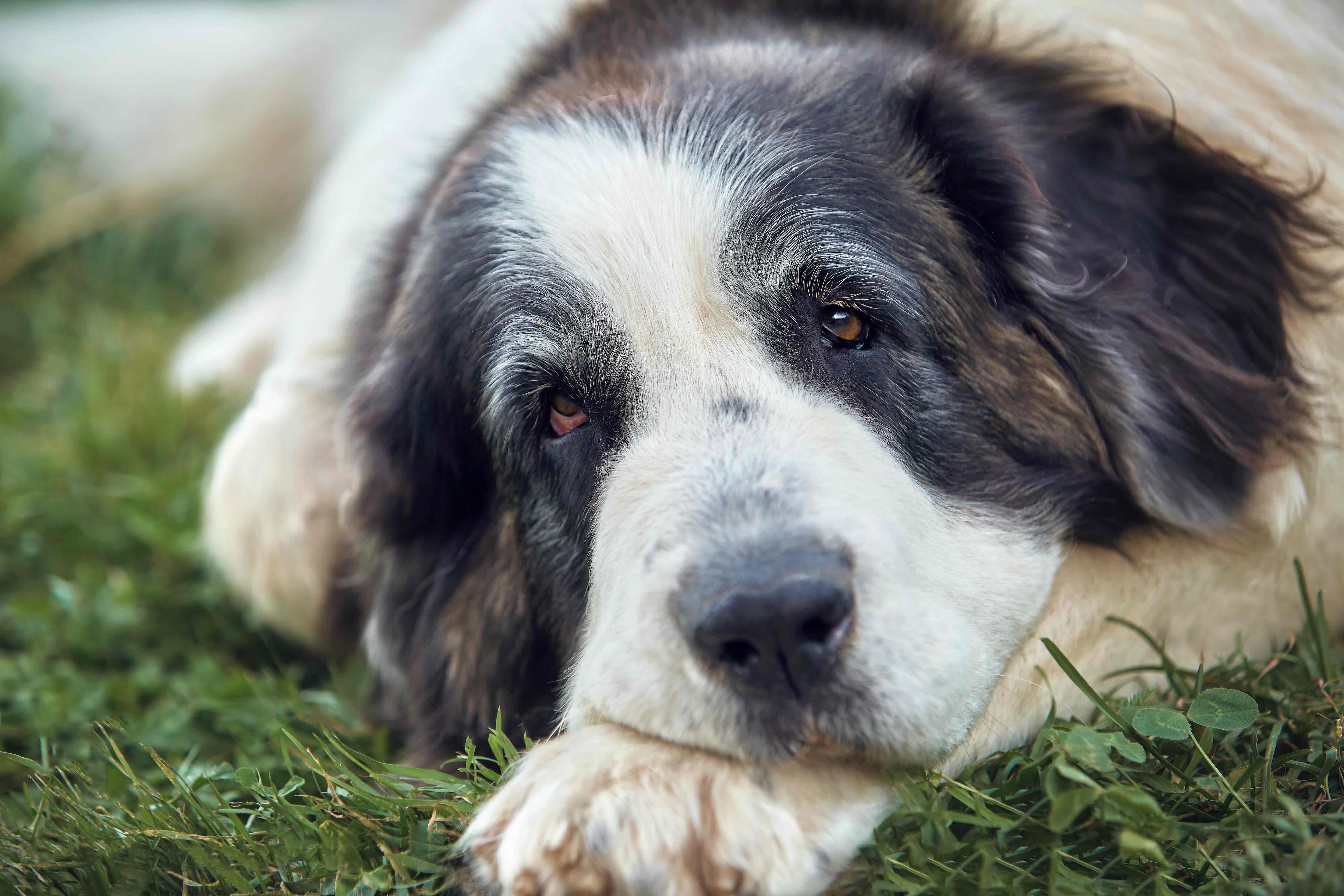
The Pyrenean Mastiff is an overall healthy dog breed, although their large size makes them predisposed to certain health issues.
Pet parents should maintain regular vet visits, and take precautions to keep their dogs in the best possible health, and be aware of the following conditions. Purchasing pet insurance may be a good investment when bringing home a Pyrenean Mastiff puppy.
Degenerative Myelopathy
Adult Pyrenean Mastiff dogs are at risk of developing degenerative myelopathy (DM), an inherited neurological disease that causes muscle weakness and loss of coordination that worsens with time. Although degenerative myelopathy isn’t curable, it can often be avoided through genetic health testing provided by most reputable breeders.
Hip and Elbow Dysplasia
Pyrenean Mastiff breeders will also screen for hip dysplasia and elbow dysplasia, two common conditions in large breeds. These skeletal conditions develop from abnormal growth in the hip or elbow joints, causing lameness, stiffness, swelling, limping, and decreased range of motion.
Hip and elbow dysplasia are diagnosed through X-rays and physical exams, and require treatment such as medication, joint supplements, weight management, physical therapy, and surgery in some more severe cases.
Pyrenean Mastiff parents should watch their puppy’s weight and avoid putting extra pressure on their joints as they grow.
Osteosarcoma
Osteosarcoma is an aggressive bone cancer that’s more common in large and giant breeds, including the Pyrenean Mastiff.
One of the earliest signs of this disease is limping or lameness, so bring your dog to the veterinarian for evaluation if you notice a change in how they walk. While there is no cure for osteosarcoma, the disease is often treated through amputation, to offer dogs a better quality of life.
Bloat and GDV
Large, deep-chested breeds are at risk of developing severe cases of bloat, also called gastric dilatation-volvulus (GDV), a condition where food and gas causes a dog’s stomach to expand and twist. This cuts off blood to the dog’s spleen and stomach.
GDV can be fatal if not treated immediately, so contact your vet right away if you notice the following symptoms:
-
Distended abdomen
-
Dry heaving
-
Sudden restlessness and anxious pacing
-
Collapse
-
Rapid, shallow breathing
-
Excessive drooling or panting
What To Feed a Pyrenean Mastiff
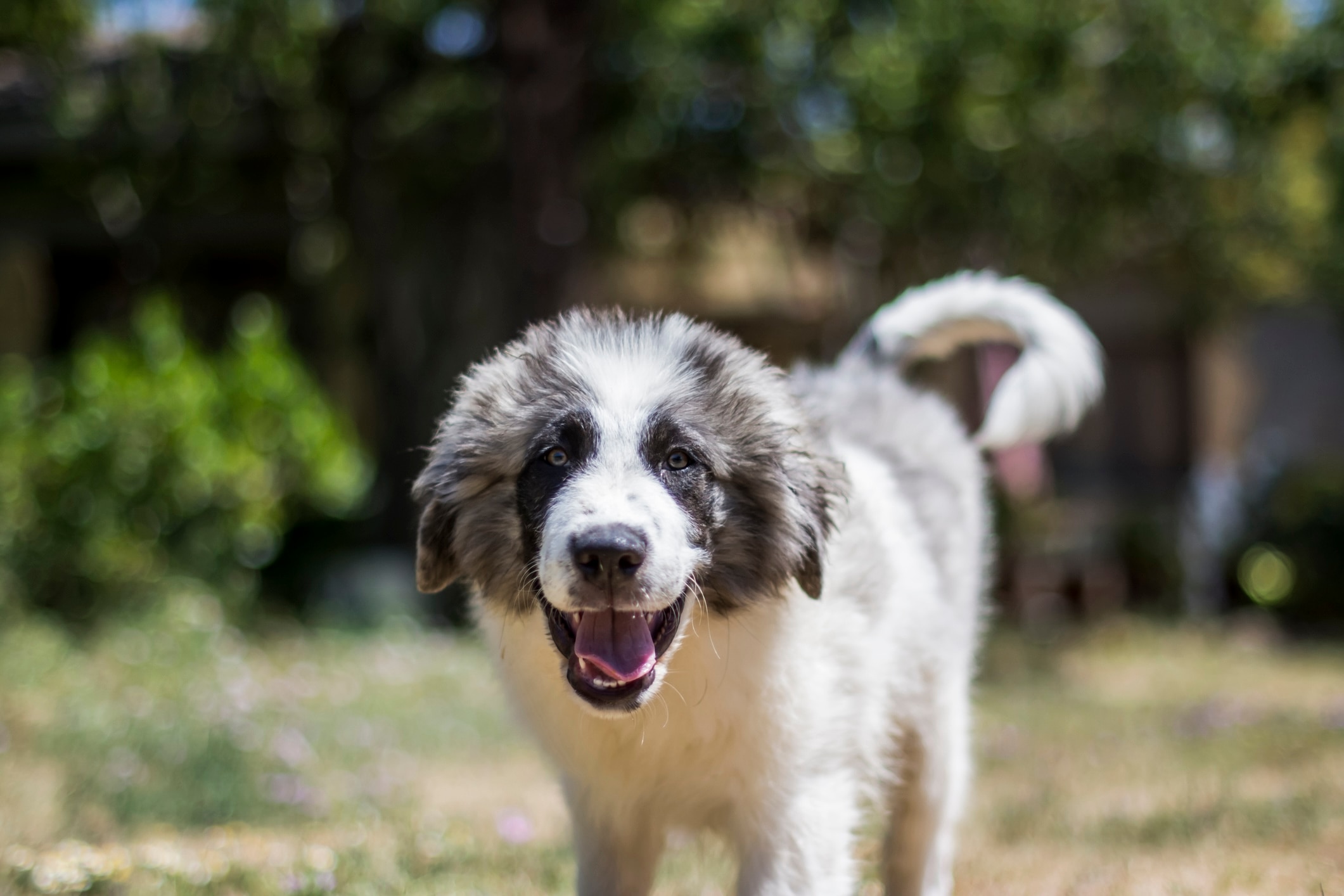
As with any dog, you should pick food for your Pyrenean Mastiff based on their age and development stage.
Choose a balanced puppy food for your dog until they’re finished growing, which is usually around the 2-year-old mark. Then you can switch to an adult food that’s high in protein. Kaiser suggests looking for foods formulated for large-breed puppies and large-breed adults.
The food must also meet the nutritional guidelines established by the Association of American Food Control Officials (AAFCO).
How To Feed a Pyrenean Mastiff
Pyrenean Mastiff dogs are prone to weight gain, so free-feeding is not recommended. The breed club suggests feeding puppies three times a day and adults twice a day.
To avoid bloat and life-threatening GDV, pet parents should take precautions around mealtimes, including:
-
Restricting exercise directly before or after eating
-
Feeding your dog two to three smaller meals throughout the day instead of one large meal
-
Slowing your dog down with a slow feeder bowl
-
Avoiding elevated food bowls, which may increase the chance of bloat
How Much Should You Feed a Pyrenean Mastiff?
How much you feed your dog varies on your Pyrenean Mastiff’s age, weight, lifestyle, and health, so there’s no one overall recommendation. Follow the label on your dog food packaging to see recommended portion sizes based on weight, and work with your vet to refine that guidance.
The best way to determine whether your Pyrenean Mastiff needs more or less food, Whittington says, is by the body condition score, which uses the feel and appearance of an animal’s ribs to assess the health of their weight.
Nutritional Tips for Pyrenean Mastiffs
Because of their massive size, Pyrenean Mastiff dogs can benefit from extra support for healthy bones. Whittington recommends bone and joint supplements to help protect their hips and elbows, and a salmon oil supplement for a healthy coat.
Never give your dog a supplement without consulting your vet first.
Behavior and Training Tips for Pyrenean Mastiffs
Pyrenean Mastiff Personality and Temperament
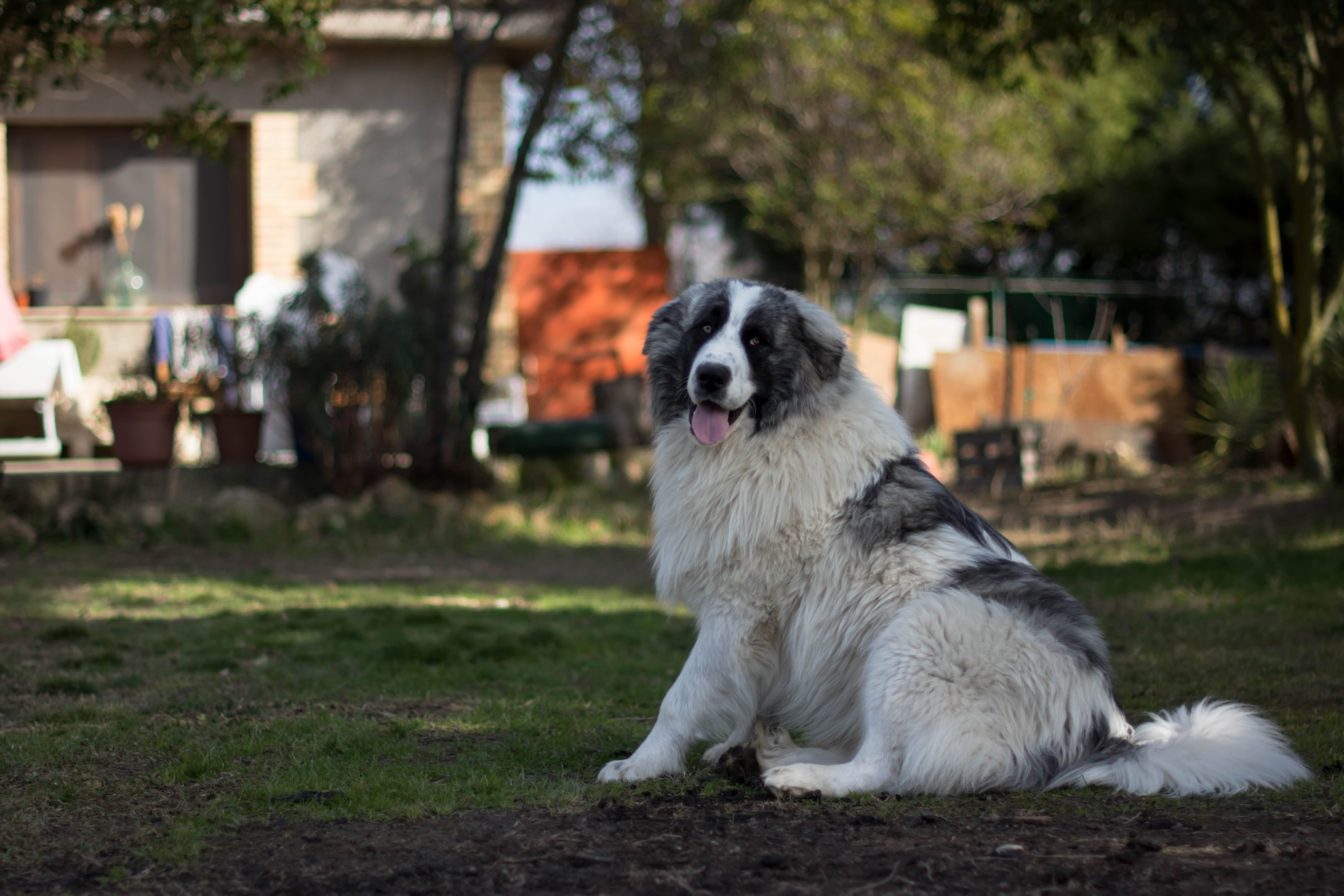
The Pyrenean Mastiff has an extremely gentle, loving personality, which can make them an excellent dog for families with kids. Like other livestock guardian dogs, this breed is calm and a little lazy, says Kaiser, but also likes having a job.
Obedience training and low-impact exercise, like leisurely walks and hikes, are great activities for the Pyrenean Mastiff.
Pyrenean Mastiff Behavior
Although the Pyrenean Mastiff is generally laid-back and low-energy, this breed does have a guardian instinct. If an unfamiliar person or animal comes around, they may bark to grab your attention.
“They let you know when something is out of the ordinary or amiss,” Kaiser says, noting that barking is otherwise uncommon for Pyrenean Mastiffs. However, once they know the situation is under control, they go back to their mellow selves.
Pyrenean Mastiff Training
Pyrenean Mastiffs are independent thinkers and can get stuck in their ways if not trained early. But they also love to please their pet parents and are up for the challenge of learning new things.
“Training is all about motivating them,” Whittington says. “Start with a high-value reward when they’re little, because everything has to be worth their time.”
As puppies, Pyrenean Mastiffs are easy to work with, and Whittington says the first year is essential. At that age, they’re eager to please—and a high-value training treat can motivate them to learn new cues. But if you don’t work on training with them each day when they’re young, “you're more likely to have a dog that kind of blows you off in their adulthood,” Whittington says.
Training an adult Pyrenean Mastiff is still doable, but it may be harder to teach them advanced cues. Whittington again suggests high-value treats that will help your dog associate good behavior with high reward.
It’s also important to socialize your puppy as soon as you bring them home, so they grow to be comfortable and confident in new situations as adults.
Fun Activities for Pyrenean Mastiffs
-
Hikes
-
Walks
-
Obedience training
Pyrenean Mastiff Grooming Guide
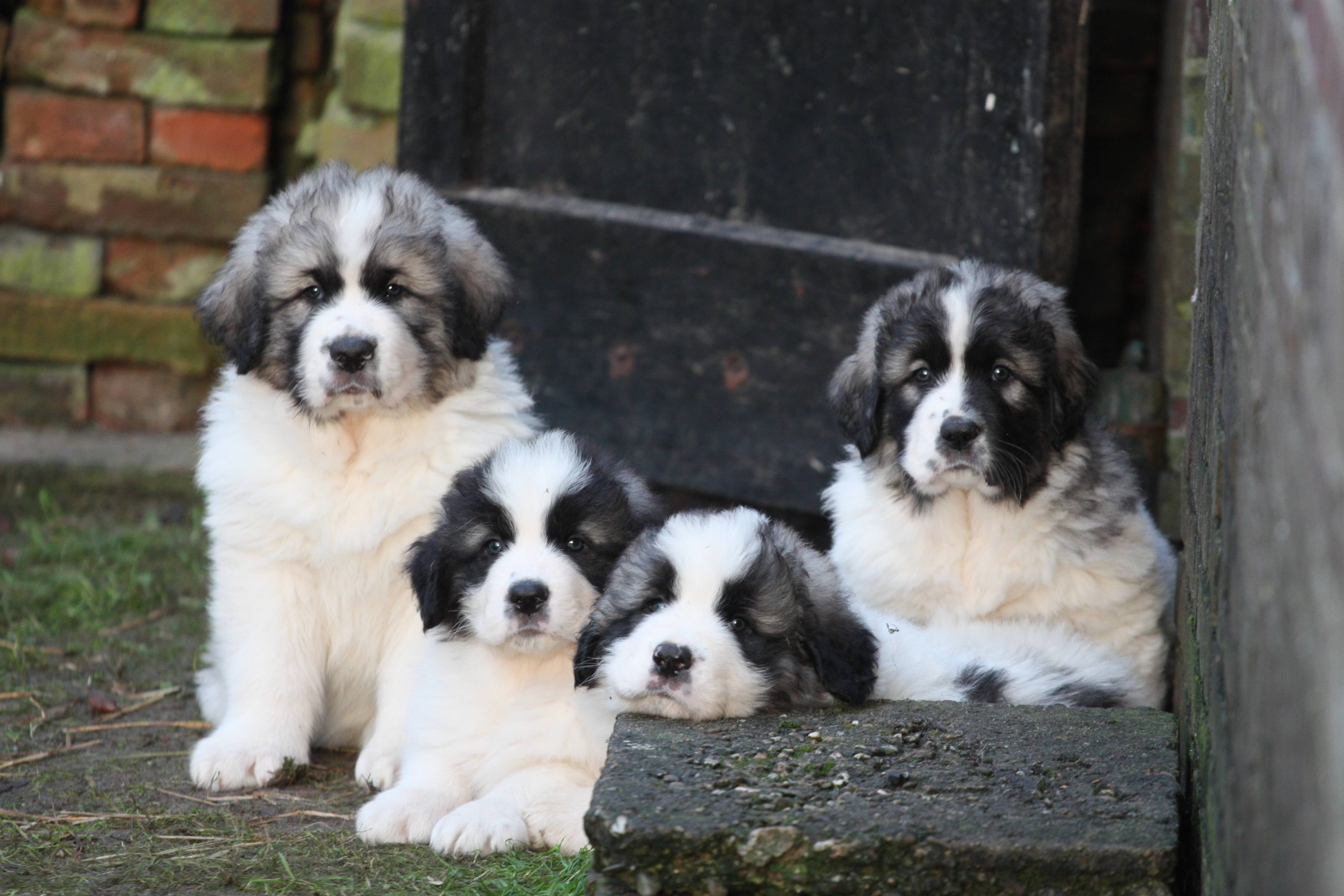
Despite their thick, fluffy coat, the Pyrenean Mastiff has relatively low maintenance grooming needs. However, this breed is a heavy shedder—particularly in the fall and spring.
Skin Care
Although Pyrenean Mastiff dogs are not prone to skin conditions, keep an eye on your dog’s skin and contact your vet if you notice any changes.
Coat Care
A Pyrenean Mastiff dog will blow their coat twice a year to prepare for their summer and winter coat. During this time, your dog will need extra brushing to avoid matting. Otherwise, Whittington says brushing your dog once every two weeks is plenty.
Her dogs’ biweekly grooming sessions also include blowing out their coats to clear dust and dander, clipping their nails, and checking for matting on the legs, tail, elbows, and behind the ears.
The Pyrenean Mastiff coat is self-cleaning, so these giant dogs only need to be bathed every three months.
Eye Care
Examine your Pyrenean Mastiff’s eyes during each grooming session, looking for clouding, irritation, or excessive watering. These can be signs of glaucoma or cataracts and will need a vet’s attention.
Ear Care
Pyrenean Mastiff dogs benefit from monthly ear cleanings, as their folded-over ears can trap dirt and debris. Use a vet-approved ear cleaning solution to flush out your dog’s ear canal and avoid an infection.
Considerations for Pet Parents
The Pyrenean Mastiff dog is an easygoing, loyal dog that just wants to be part of the family. They don’t need lots of exercise and only need light grooming every other week.
As long as you have the space for this big dog—and the time and attention to show them your affection—this breed will be happy in your home.
Pyrenean Mastiff FAQs
Are Pyrenean Mastiffs good family dogs?
Yes, Pyrenean Mastiffs can be gentle and trustworthy with children and love to give and receive affection, so they make great family dogs.
What’s the difference between a Great Pyrenees and a Pyrenean Mastiff?
Both the Great Pyrenees and the Pyrenean Mastiff were bred as guardian dogs in Spain, and the breeds have a lot of similarities in appearance and temperament. However, the Pyrenean Mastiff is larger than the Great Pyrenees.
How big does a Pyrenean Mastiff get?
Adult Pyrenean Mastiffs can weigh up to 190 pounds and reach 31 inches in height.
